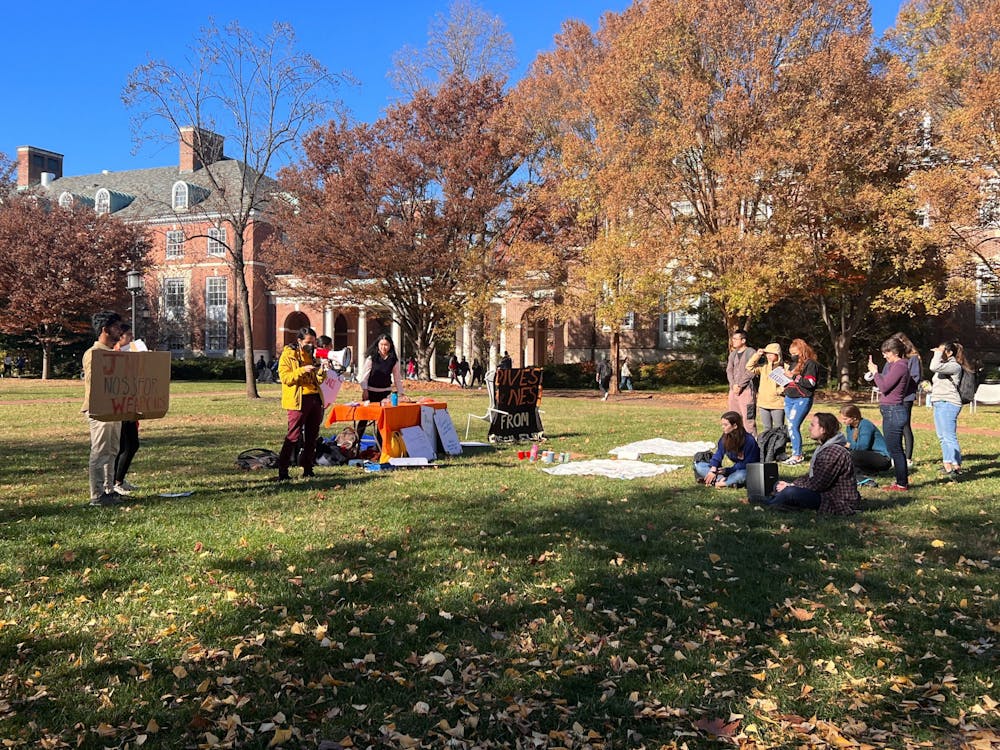The JHU Dissenters and Refuel Our Future co-hosted a teach-in at Keyser Quad on Nov. 9 to educate attendees about the University’s involvement in war and climate change.
Hopkins students gave speeches about issues related to the Applied Physics Lab (APL), the Johns Hopkins Police Department (JHPD), fossil fuel investments, the University’s collaboration with the Space Force and Reserve Officers’ Training Corps (ROTC).
The teach-in began with postdoctoral fellow Heidi Nicholls defining militarism.
“Militarism is the perpetual state of war that we live in: how our lives are structured by war and war-making processes,” she said. “[JHU Dissenters] believe we already have everything we need to be safe. If we directed all these resources that Hopkins is pouring into militarism… to serve communities… then we could be living collectively a lot longer [and] better.”
Nicholls pointed out that the U.S. is the number one global military spender. She added that Raytheon, one of the five biggest defense contractors, is affiliated with APL.
During the event, senior Bonnie Jin gave a speech detailing how Hopkins is complicit in militarization.
“Universities, including [Hopkins], have long been connected to the military-industrial complex,” she said. “They produce knowledge that informs many other political institutions, and they also have a direct relationship with war corporations and military institutions.”
According to Jin, the JHU Dissenters have been conducting research about militarization on the Hopkins campus over the past month. They found that APL was established in 1942 to aid in war efforts by producing guided missile technology. APL was supposed to disband at the end of World War II, but upon the government's request, the lab continued to run as a public service.
The International Campaign to Abolish Nuclear Weapons (ICAN) released a report in November of 2019 identifying Hopkins as a university involved in the development and maintenance of nuclear weapons. The Dissenters claim that the APL is main channel for the University’s involvement in defense research, where they found that the lab was awarded a contract with the U.S. Department of Defense worth up to $10.6 billion in 2022.
To give another example of the University’s militarization, senior Marcos Hernández Canchola discussed the War on Terror and the U.S.’s twenty-year occupation of Afghanistan.
“In the name of exporting so-called U.S. democracy and capitalism, the U.S. leverages its military resources as an aggressor against Afghans,” they said. “Afghans continue to reckon with the legacies of America’s violent occupation.”
Canchola demanded that the University end its complicity in violence against Afghans by divesting from defense contractors like Raytheon that profited from the nation’s occupation. They stated that this would also involve putting an end to APL’s contract with the U.S. military.
Senior Rohit Sivananthan then described the impact climate change will have in Baltimore, claiming that in 2080 the climate will be seven degrees Fahrenheit hotter with 35% more rain. He emphasized that the city’s infrastructure is not equipped to handle those changes, and the University has a responsibility to the Baltimore community on this issue.
“[Hopkins] is a powerful institution in Baltimore and greater Maryland,” he said. “We have the responsibility to pay attention to this problem, and we have a responsibility as students to fight for the recognition of this responsibility.”
Sivananthan added that one of the first actions the University should take is divesting from fossil fuels, noting that many peer universities have divested. He added that many of these institutions, including Harvard and Cornell, have larger endowments than Hopkins, meaning that there is no financial reason for the University not to divest.
In an interview with The News-Letter, senior Wei Zhou highlighted that she found learning about the University’s inaction disappointing.
“One thing that [was] striking for me is how many other institutions in the [U.S.] have taken action on these issues, but Hopkins just didn’t,” she said.
Organizers also touched on violence related to policing. Hernández denounced the University’s plan to implement the JHPD.
“[Hopkins] joins the city and the state in sustaining violent systems designed to punish and displace the very people of color at the margins of wealth inequality,” they said. “[Hopkins] positions the police as an institution of so-called public safety, but where is the safety in the arrest, incarceration and surveillance of predominately Black community members who are denied the material resources to create real safety for themselves?”
When Jin discussed ROTC at Hopkins, she asserted that the JHU Dissenters do not oppose individual veterans or members of ROTC on campus, but she claimed that their uniforms illustrates the militarization of the Hopkins campus. She called for the program to be disbanded and for students in ROTC to receive comparable scholarships.
“The authoritarian chain of obedience cultivated in the military is fundamentally antithetical to the ideal of critical, democratic debate fostered by the University,” she said.
Hopkins recently announced a collaboration with the Space Force, which Jin addressed at the event as well.
“The Space Force would extend colonization, resource extraction and militarization into space,” she said. “In a time when the world should be united in solving shared crises, from climate change to global inequalities, the Space Force represents the further consolidation of borders.”
Rohit added that there is an abundance of career opportunities for STEM students at Hopkins tied to defense contractors, which may force many graduating students to become complicit in militarism. He demanded that the University create more opportunities to connect STEM majors with life-affirming causes instead.
Graduate student Sebastian Link attended the teach-in and stressed the importance of being educated about the University’s role in climate change and militarism in an interview with The News-Letter.
“We are part of the military machine that they’re describing,” he said. “We are not outsiders, even if we want to appear as outsiders.”
Editor’s Note: Jin’s comments have been edited for accuracy. One of the comments was also wrongly attributed to Jin.
The News-Letter regrets these errors.





